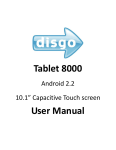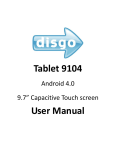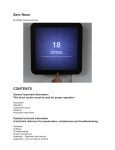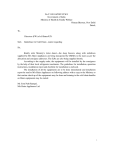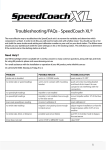Download Disgo Tablet 6000 User manual
Transcript
Tablet 6000 Android 2.1 7” Touch screen User Manual Contents 1. Accessories 2. Getting Started 2.1 Appearance 2.2 Using the tablet 2.3 Toolbar 2.4 Manage your desktop 3. Settings 3.1 Wireless & networks 3.2 Sound & display 3.3 Location & security 3.4 Applications 3.5 Accounts & sync 3.6 Privacy 3.7 SD card & device storage 3.8 Search 3.9 Language & keyboard 3.10 Date & time 3.11 Calibration 3.12 About Device 4. Using MicroSD Card 5. Using HDMI 6. Troubleshooting 1 1. Accessories Inside the disgo Tablet 6000 packaging, you will find: 1 x Tablet with stylus, 1 x Power adapter 1 x 2GB MicroSD card 1 x User manual 1 x OTG cable 1 x USB to mini USB cable 1 x Tablet case 2. Getting Started 2.1 Appearance 2 Button descriptions Power When the tablet is switched off, press and hold this button to turn it on. When the tablet is turned on, this acts as a Back (Previous page/Exit application) button for the tablet. Menu Several options are listed in this Menu. Press this button to have the menu bar displayed. Reset Use this button to force a shutdown of the device. If the device freezes it may require a reset. IMPORTANT 1) For information on inserting/removing the Micro SD card, please refer to section 4 – Using Micro SD card. Failure to do so may result in damage to the memory card. 2) Some applications run in a full screen mode. The icons on the toolbar will not be displayed. Please use the Power button on the back of the tablet in these circumstances. 2.2 Using the tablet When the tablet is turned on for the first time, you will need to calibrate the touch screen. Please follow the procedures on the screen to complete this process. You will then return to the desktop. To use the pre-installed applications on the home page, simply touch the relevant icon. To access all other applications, simply drag the desktop to the left, i.e. the applications are to the right hand side of the desktop. Touch and hold for two seconds and then drag the application to the far right of the screen in order to open a new application. Touch and hold one of the applications until a dustbin icon appears which you can use to remove the application shortcut. 3 2.3 Toolbar Home Touch on Home to return to the desktop. This action will not close the applications that are open. SD card indicator Displays the status of the MicroSD card upon insertion or removal. Orientation icon Manually change the screen orientation Wi-Fi indicator Displays the connection status of the Wi-Fi. Battery indicator Shows the charge status of the battery Time indicator Shows current time. Volume Down Decreases volume. Increases volume. Volume Up Menu Shows menu of the application on the bottom of the screen. Back Returns to previously viewed screen 4 2.4 Manage your desktop Press the Home icon on the top left of your toolbar to return to the main desktop. In order to delete an icon or widget from the desktop, touch and hold the icon / widget until the arrow on the right hand side becomes a dustbin icon. Drag the icon / widget onto the dustbin until the icon / widget turns red. Release the icon / widget to delete. Note: The items being deleted are shortcuts only and are not actual applications. These applications can be accessed again as noted in section 2.2 To insert a new or previously deleted icon / widget onto the current desktop, click Menu and choose Add Application/Widget. 5 3. Settings Touch the Settings icon to enter this menu. Settings page Note: The settings, which are compatible with this device, are noted in this chapter. Further setting options may appear on the device but may not be compatible. 3.1 Wireless & networks Wi-Fi Wi-Fi settings Use static IP Switch on Wi-Fi functionality By enabling Network notification, the networks will be refreshed and a list of available connections will be shown. Choose Menu to enter advanced options. This function allows you to enter the IP address of your wireless access point. 6 IMPORTANT o Upon exiting the Advanced page, press Menu Save to save all changes. o If a network is secured and requires an access key, the tablet will automatically detect the encryption details and will request that you enter the key (password). 3.2 Sound & display Silent mode Media volume Audible selection SD card notifications Animation Brightness Screen timeout 3.3 Location & security Using wireless networks Visible passwords Mutes the device. Adjusts the volume for music and videos Choose to play sound upon screen selection. Choose to play sound for MicroSD card notifications. This function depends on applications that require MicroSD card notification. Selects page change effects; fade, etc. Adjusts the brightness of the screen. Adjusts the delay before the screen turns off. Please be aware of applications (such as Maps) which access the wireless network. If you wish to use these applications, please accept the agreement onscreen. Password characters will be shown when you are typing. Only the last character will be visible, others will be masked. 7 3.4 Applications Unknown sources Manage applications Running services 3.5 Accounts & sync Add account Allows installation of non-Market (Android Market) applications. Please read carefully any agreement upon downloading. Manage and remove installed applications. Please note that some applications may cause the system to freeze during installation or removal. This is due to a memory handling issue of the application and the device. It is suggested to clear the cache before removing the application. The “Clear Cache” option in the 'Remove application' page. If the system freezes while installing or removing, please press the reset key on the back side of the tablet and turn on the device again. View and control currently running applications You may add your google email account and synchronize the account in the google server. For google server details, please use m.google.com. 8 3.6 Privacy Factory data reset This erases all data to factory default. Powering on the tablet will take longer after a reset. All applications installed and personal settings will be erased. Please acknowledge all warnings when resetting. 3.7 SD card & device storage Total space Shows total capacity of MicroSD card. Available space Shows available space of MicroSD card. Unmount SD card This option is used for safe removal of the MicroSD card. Please see Section 4 – ‘Using MicroSD card’ for further information. Available space Shows available space on device 3.8 Search Google search settings Searchable items Clear search shortcuts 3.9 Language & keyboard Select locale Android keyboard User dictionary Shows suggestions from Google as you type. Choose what to search on the device. Clear shortcuts to recently chosen search results. Select language and region. Onscreen keyboard settings. Add and remove words from user dictionary. You can add words by pressing the “Menu” icon. 9 3.10 Date & time Set date Select time zone Set time Use 24-hour format Select date format Set date on device. Select time zone on device Set time on device. Use 24-hour format or am / pm mode. Select date display options 3.11 Touch screen calibration Performs the touch panel calibration. 3.12 About Device Displays device information. 4. Using MicroSD card In order to safely remove the storage card from the device go to Settings SD card & device storage. Choose ‘Unmount MicroSD card’ for safe removal of the card. The toolbar will display MicroSD card safe to remove when this option is chosen. Please wait 3 seconds before removing the card. Once the MicroSD card is removed, the toolbar will display Removed MicroSD card. Re-inserting the MicroSD card will show Preparing MicroSD card on the toolbar status. Removing MicroSD card without first unmounting will give the following message MicroSD card unexpectedly removed on the toolbar. IMPORTANT Any unexpected removal may cause the MicroSD card operation to fail. You will have to reboot the device in order for the MicroSD card slot to work again. Removing the MicroSD card without unmounting may damage the card. Please also refer to 3.7 MicroSD card & device storage. 10 5. Using HDMI User may use HDMI output when playing videos. When the tablet is playing video through the default player, connect the HDMI cable as necessary. Press the Menu button on the back of the tablet to project the video onto the desired screen. 6. Troubleshooting 6.1 I cannot connect to Internet using Manual Setup. Ans: Ensure you have used Menu Save when exiting the advanced settings page. 6.2 I can see my access point, but I cannot connect to Internet. Ans: If your access point (AP) supports multiple access points at a time, you have to connect the device using WSA encryption and not WEP. Please refer to your access point device manual for setup details. 6.3 My MicroSD card is not being detected and shows damaged SD card. Ans: Please re-insert the MicroSD card and try again. If it fails, please power-off the device and power-on again with MicroSD card already inserted. Please make sure you have removed the MicroSD card in the proper procedure as described in part 4. 6.4 My system froze while installing / removing applications. Ans: This may be caused by a memory handling error. Use Clear Cache option (See section 3.4) and Force Close icon in application manager before removing the software. If the system continues to freeze, please press reset on back of the device and power-on again. 6.5 My device freezes while powering-on. Ans: This may be caused by a failure in reading the MicroSD card. Please press reset and power-on again. Also, please ensure that the card is fully inserted. 11













